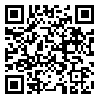Accepted article
Back to the articles list |
Back to browse issues page
1- university of Bojnord
2- university of mohaghegh ardabili ,m.amani@uma.ac.ir
3- univesity of bojnord
2- university of mohaghegh ardabili ,
3- univesity of bojnord
Abstract: (50 Views)
Objective: Smartphone addiction among adolescents is associated with academic and psychological consequences, and personality and family factors can act as key contributors to smartphone addiction.
Methods: This study examined whether fear of missing out and smartphone addiction mediate the associations of interpersonal sensitivity and family environment with academic procrastination. A cross-sectional, descriptive-correlational design was used. The statistical population was female students in grades 10-12 in Mashhad. A two-stage cluster sampling method was used for sampling. Three hundred and eighty-four female students completed a short-form Family Environment Scale (Moos & Moos, 1994), Interpersonal Sensitivity Measure (Boyce & Parker, 1989), Academic Procrastination test (Sevari, 2011), Mobile Phone Addiction Questionnaire (Sevari, 2014), and Fear of Missing Out Scale (Przybylski et al., 2013).
Results: The findings revealed significant positive associations among academic procrastination, fear of missing out, smartphone addiction, and interpersonal sensitivity. Also, family environment had a significant negative correlation with academic procrastination, fear of missing out, and smartphone addiction. The results of structural equation analysis in the fitted model showed that smartphone addiction and fear of missing out significantly mediated the relationships between interpersonal sensitivity and family environment with academic procrastination.
Conclusion: Weak family connections and interpersonal sensitivity are risk factors for smartphone addiction and fear of missing out, which ultimately lead to academic procrastination in adolescents.
Methods: This study examined whether fear of missing out and smartphone addiction mediate the associations of interpersonal sensitivity and family environment with academic procrastination. A cross-sectional, descriptive-correlational design was used. The statistical population was female students in grades 10-12 in Mashhad. A two-stage cluster sampling method was used for sampling. Three hundred and eighty-four female students completed a short-form Family Environment Scale (Moos & Moos, 1994), Interpersonal Sensitivity Measure (Boyce & Parker, 1989), Academic Procrastination test (Sevari, 2011), Mobile Phone Addiction Questionnaire (Sevari, 2014), and Fear of Missing Out Scale (Przybylski et al., 2013).
Results: The findings revealed significant positive associations among academic procrastination, fear of missing out, smartphone addiction, and interpersonal sensitivity. Also, family environment had a significant negative correlation with academic procrastination, fear of missing out, and smartphone addiction. The results of structural equation analysis in the fitted model showed that smartphone addiction and fear of missing out significantly mediated the relationships between interpersonal sensitivity and family environment with academic procrastination.
Conclusion: Weak family connections and interpersonal sensitivity are risk factors for smartphone addiction and fear of missing out, which ultimately lead to academic procrastination in adolescents.
Keywords: academic procrastination, smartphone addiction, fear of missing out, interpersonal sensitivity, family environment
Type of Study: Original Research Article |
Subject:
Substance abuse and dependence
Received: 2025/08/2 | Accepted: 2025/09/8
Received: 2025/08/2 | Accepted: 2025/09/8
| Rights and permissions | |
 |
This work is licensed under a Creative Commons Attribution-NonCommercial 4.0 International License. |





